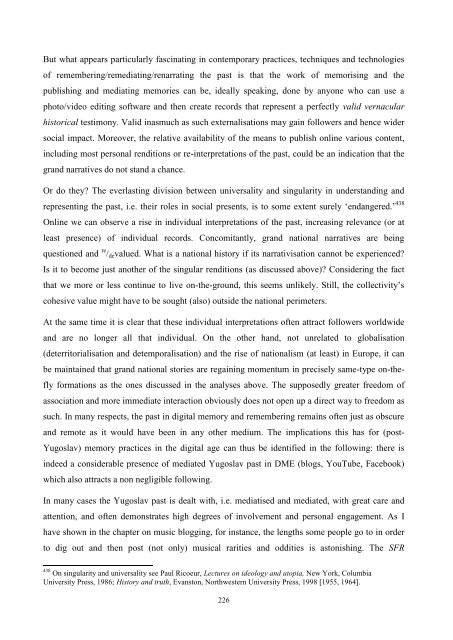UNIVERSITY OF NOVA GORICA GRADUATE SCHOOL ...
UNIVERSITY OF NOVA GORICA GRADUATE SCHOOL ...
UNIVERSITY OF NOVA GORICA GRADUATE SCHOOL ...
You also want an ePaper? Increase the reach of your titles
YUMPU automatically turns print PDFs into web optimized ePapers that Google loves.
But what appears particularly fascinating in contemporary practices, techniques and technologies<br />
of remembering/remediating/renarrating the past is that the work of memorising and the<br />
publishing and mediating memories can be, ideally speaking, done by anyone who can use a<br />
photo/video editing software and then create records that represent a perfectly valid vernacular<br />
historical testimony. Valid inasmuch as such externalisations may gain followers and hence wider<br />
social impact. Moreover, the relative availability of the means to publish online various content,<br />
including most personal renditions or re-interpretations of the past, could be an indication that the<br />
grand narratives do not stand a chance.<br />
Or do they? The everlasting division between universality and singularity in understanding and<br />
representing the past, i.e. their roles in social presents, is to some extent surely ‗endangered.‘ 438<br />
Online we can observe a rise in individual interpretations of the past, increasing relevance (or at<br />
least presence) of individual records. Concomitantly, grand national narratives are being<br />
questioned and re / de valued. What is a national history if its narrativisation cannot be experienced?<br />
Is it to become just another of the singular renditions (as discussed above)? Considering the fact<br />
that we more or less continue to live on-the-ground, this seems unlikely. Still, the collectivity‘s<br />
cohesive value might have to be sought (also) outside the national perimeters.<br />
At the same time it is clear that these individual interpretations often attract followers worldwide<br />
and are no longer all that individual. On the other hand, not unrelated to globalisation<br />
(deterritorialisation and detemporalisation) and the rise of nationalism (at least) in Europe, it can<br />
be maintained that grand national stories are regaining momentum in precisely same-type on-thefly<br />
formations as the ones discussed in the analyses above. The supposedly greater freedom of<br />
association and more immediate interaction obviously does not open up a direct way to freedom as<br />
such. In many respects, the past in digital memory and remembering remains often just as obscure<br />
and remote as it would have been in any other medium. The implications this has for (post-<br />
Yugoslav) memory practices in the digital age can thus be identified in the following: there is<br />
indeed a considerable presence of mediated Yugoslav past in DME (blogs, YouTube, Facebook)<br />
which also attracts a non negligible following.<br />
In many cases the Yugoslav past is dealt with, i.e. mediatised and mediated, with great care and<br />
attention, and often demonstrates high degrees of involvement and personal engagement. As I<br />
have shown in the chapter on music blogging, for instance, the lengths some people go to in order<br />
to dig out and then post (not only) musical rarities and oddities is astonishing. The SFR<br />
438 On singularity and universality see Paul Ricoeur, Lectures on ideology and utopia, New York, Columbia<br />
University Press, 1986; History and truth, Evanston, Northwestern University Press, 1998 [1955, 1964].<br />
226

















